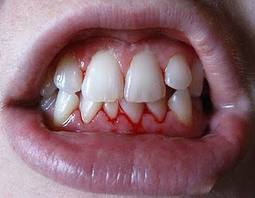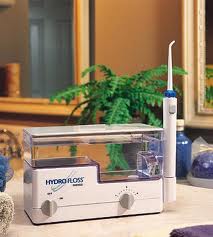What to do if I have bleeding gums
- Control the bleeding by applying pressure directly on the gums with a gauze pad, soaked in ice water. Avoid using gum gels to relieve pain and arrest bleeding. It only offers temporary relief and the disease thus advances further, causing more pain and complications.
- If the bleeding is due to local irritants, a professional scaling may be necessary to halt the bleeding.
- Maintain good oral hygiene, both of your teeth and soft tissues in the mouth
- brush teeth at least twice a day
- correct technique of tooth brushing: make sure that you angle your toothbrush bristles to an angle of about 45 degrees to the surface of your teeth, and use gentle, circular motions to massage and brush your teeth and gums. Do not use the back and forth horizontal motion as this can irritate and damage your gums instead, making them sore and more likely to bleed or recede. Furthermore, it will abrade away tooth surface near the gums causing “Cervial abrasionâ€.
- floss daily
- Use mouthrinses or warm salt water to rinse your mouth. Hydrogen peroxide mixed with water may be used. Chlorhexidine mouthwashes are recommended as they have antibacterial and antfungal properties. You may find the foul after taste unpleasant, therefore it is better to rinse with this after meals. Avoid using alcohol-containing mouth rinses, which may aggravate the condition. Another good mouth rinse would be to use baking soda (mixed with tap water) to rinse the mouth, especially after meals. Baking soda is alkaline in nature, and can neutralize the acids produced by bacteria in the mouth, especially after meals.
- Use an oral irrigation device on the low setting to massage the gums.-hydrofloss or Waterpik
- Frequent visits to the dentist-recommended once every half a year.
- Whether you opt for a manual or electric toothbrush, choose one with soft nylon bristles that have blunted ends. Even though you can find brushes with medium or hard bristles, they may damage the enamel on your teeth or cause red and swollen gums.
4. Well-balanced diet for healthy teeth and gums
Eat a well-balanced diet, including plenty of Vitamins. Increase vegetables and fruit intake. Avoid snacking in between meals and reduce carbohydrate intake.
Clean teeth: drink water, chew on celery, carrot or cucumber to clean the gaps between teeth.
Be cautious about taking extremely hot or cold foods or beverages when you’re experiencing gum problems, as this will cause more pain to your gums.
5. Stop smoking or using tobacco products
6. Treat gum diseases
7. Identify and treat underlying systemic problem
Gum bleeding may be due to underlying systemic conditions such as bleeding problems, high blood pressure and pregnancy. These should be identified and addressed before targetting the problem locally.
 When to See a Dentist
When to See a Dentist
If you are experiencing severe gum bleeding or bleeding that has been going on for a significantly long period of time, you should consult your dentist. Similarly, if you have tried treatment options and your gums continue to bleed and show no sign of improvement, a visit to your dentist is recommended. In many cases, chronic bleeding is the symptom of another disease or condition that must be treated. Chronic or severe bleeding can also be an indication of severe dental issues. So it is prudent that the cause of bleeding is 1st identified.
Do not ignore bleeding in the gums. If you do not treat it early on, the gums may recede or shrink, allowing infection to enter the base of the teeth and loosen it, i.e. periodontal diseases. Once gums recede, gaining normalcy is tough, because even after treatment, gums will not hold the teeth as tightly as before.
Your dentist should examine your teeth and gums, and ask questions such as:
- Are your gums bleeding profusely
- Did the bleeding begin recently
- Do the gums bleed frequently or only occasionally
- Have you had gum problems before
- How often you brush and floss
- Do you use a soft or hard bristled toothbrush and how vigorously do you brush your teeth
- When was the last time you had your teeth cleaned at the dentist
- Have you changed your diet
- Do you eat adequate amounts of fruits and vegetables or supplemental vitamins
- Do you have a high carbohydrate diet.
- What medications do you take, do you take anticonvulsants, anticoagulants or aspirin
- Are you pregnant
- Some mouthwash or tooth paste could provoke gums to bleed, so your doctor should know if you changed some of these recently.
- Do you have other symptoms? eg. sore throat.
